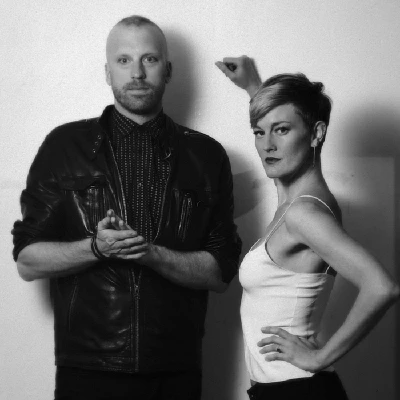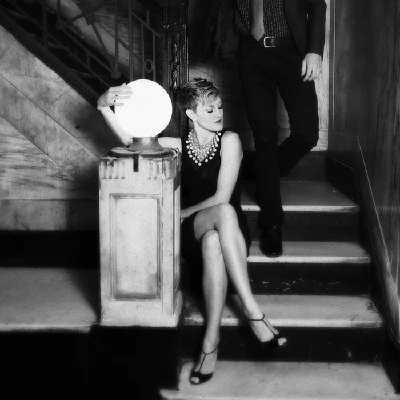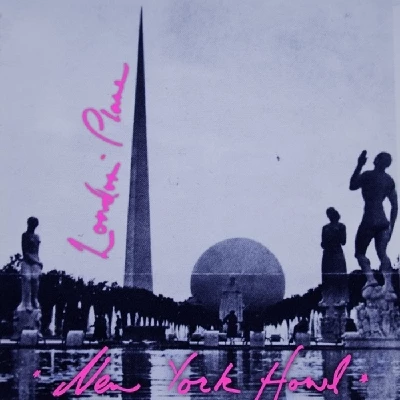published: 29 /
6 /
2018

In his first British interview songwriter David Mosey speaks to John Clarkson about his band London Plane's debut album 'New York Howl', which takes it inspiration from a diary from a young woman who had moved to New York in the 70's and that he found amongst a pile of garbage on a sidewalk.
Article
When songwriter David Mosey found a suitcase lying amongst a pile of garbage on a sidewalk in his adopted home town of New York City, he felt drawn to take it home. Inside, along with some books and broken records, he found a diary with, inscribed on the front cover, its owner’s name of ‘Francis’.
Its first entry, which was June 12th 1975, began with the words, “So I made it to New York…” Its entries continued daily, monthly, then only sporadically, before concluding after a flurry of entries abruptly in 1982 with its final sentence, “I hope he gets it.”
Despite its masculine spelling, ‘Francis’ was a young woman from Portland, Oregon. In her diary, the would-be scenester and poetess wrote of her love affairs, and her sometimes awkward immersion into her life in her new city.
Mosey was haunted by Francis. He started dreaming about her, and imagining her visible but just out of sight, having left the room he had just entered or walking on the street he was on somewhere ahead of him. Taking the diary as his inspiration, he began writing songs from Francis’ perspective.
When Mosey met singer Cici Cole, she offered to take the part of Francis, and their new band London Plane, a sextet, began recording Mosey’s songs about her for an album.
‘New York Howl’, London Plane’s debut album, is a synth-drenched new wave/post-punk-influenced record, which combines the wall-of-sound of Phil Spector and the Ronettes with the sultry edginess of the Psychedelic Furs at one level and Siouxsie and the Banshees at another. Cici Cole in her vocals meanwhile has all the dynamism of Debbie Harry. Its tracks include the soaring title track which tells of Francis’ fear and excitement at being in New York City, the brooding ‘Make It Our Own’ and break-up ballad ‘Parting Days’.
In what was his first British interview, David Mosey spoke to Pennyblackmusic about ‘New York Howl’ and Francis’ ghost.
PB: 'New York Howl' could be defined as being a concept album about twin on-off love affairs, Frankie’s own romance and also that of hers with New York itself. Do you think that is an accurate interpretation?
DM: Yes. Her relationships, both with the city and the men and women in her life are like the seasons in New York; brightness, coloUr, clarity after long spells of darkness, dreariness. It’s fair enough to call 'New York Howl' a concept album, though each song is intended to be its own complete piece. There aren’t really chapters. Rather, an adventure and a resolution exist within each song. That said, Francis’ ghost is less opaque with each song.
PB: The discovery of this diary had a profound effect on you. You started dreaming about Francis, and kept imagining that she was present but just beyond sight. Are you like her originally from outside New York? Why do you think that she and her story had such an impact on you?
DM: Yes, in fact, like Francis I’m originally from Portland, Oregon. Her story, like mine, isn’t unique. It’s repeated daily, that is, moving to the city alone without much money and with very little of what might be considered a plan. This is one of the reasons why I think the album will resonate. It wasn’t the diary itself that I was drawn to; it was her writing. It was descriptive in a way that was familiar. It isn’t just that our experiences were similar - sometimes eerily so - but her manner of painting the picture was as I might have. I think I needed Francis’ diary about the time that I found it. It helped me to find my way through a period of isolation, a time where there seemed to be obstacles at every turn. It even felt at times as though she were watching over me.
PB: To read someone else's diary is an intimate experience and opens up an otherwise private world, even if it was written thirty-five to forty years ago. How do you think Francis would feel to know that it had inspired this set of songs all these years on? Do you think that she would be happy about it? Were you concerned that she might feel that her privacy had been invaded?
DM: I was concerned about the invasion of privacy, which is why I don’t have the diary now. We had a bit of a funeral for it in Central Park. It will never be found. As for how Francis might feel about all of this, I doubt that she would have been pleased with anyone reading her diary, but I also think that as an artist herself - her poetry is quite good, I think - she might have approved of it having influence on an endeavour such as an album. I only hope we’ve done it justice. I think we have.
PB: When you die in New York and have no one to sort out your possessions, your apartment is cleared and they are put out in the street for the rubbish collectors to take away. Is it safe to presume as a result that Francis is dead? Were you able to do any subsequent research or investigation into what happened to her after the diary ended in 1982 or is all that you know about her from that?
DM: I don’t know what happened to her. It’s true that when you die, your things are often simply left on the sidewalk. But this also happens when you run away, as sometimes occurs. A friend of mine was so desperate to make a clean getaway that he took nothing but his wallet and some clothes. Everything else – cell phone, guitars, vinyl collection, photographs, letters – were abandoned. I don’t think that any of his friends ever found him, but I believe that he's alive. I hope that Francis did something similar. But because something as personal as her diary was left behind, it feels impossible that she ever really left. Whether she’s living or dead, 'New York Howl' is a ghost story.
PB: The diary concludes abruptly with her last words "I hope he gets it", which could be interpreted in various ways. What do you think that she meant by it?
DM: Her last entries were scattered. There were periods where there were no entries for days, then a flurry of somewhat disjointed messages. From what I could tell, the “it” was a letter. Francis was trying to reconnect with someone that she had lost. Redemption, second chances are recurring themes in the record. For the album’s last song, we said goodbye to Francis with 'You Can Be Normal', delivered with a wink.
PB: ‘New York Howl' reflects on isolation, regret and despair yet captures some of the magic of being in love and starting to find one's way in a new environment. Do you see Francis' story as being one of hope or, given the way the diary suddenly ends and was left in the street, as ultimately one of sadness?
DM: The songs are trying to break people’s sense of isolation. What Francis is telling us and what we’re reflecting onto one another is that isolation doesn’t exist unless you let it. We’re never alone. Francis is her most hopeful when emerging from the helplessness and sadness she experienced following the murder of John Lennon. The soundtrack to her life at the time was Lennon and Bowie. At least, she mentioned them often. The song 'Cloud Light' reverberates that feeling of reappearance after a time of dissolution and decay. With her re-emergence, it seems love often followed for her, as it tends to do.
PB: 'New York Howl' to these ears combines the influences of New York bands such as the Ronettes through to Blondie. Was it your intention to create a soundtrack with the sort of music that Francis might have been listening to between 1975 and 1982 or did it just turn out that way?
DM: I began writing the songs knowing full well that I wouldn’t be singing them, but I hadn’t met Cici yet. In the beginning, I wrote with Ronnie Spector’s voice in my head. Eventually, that voice was replaced with Cici’s whom I met back stage at a tribute concert for Lou Reed following his death. Both Cici and I were singing in the show, and we were introduced by mutual friend and former Psychedelic Furs’ keyboardist Joe McGinty. I told Cici about Francis, and since Cici likes ghost stories she said that she’d sing it.
I would say that the intent all along was to let the post-punk era inform the sound of the album. It’s also that the music from that time is just very relevant again, and always was. The songs are sometimes saccharine-ey and sometimes shadowy; straight ahead guitar-driven pop with lots of hooks was the right vehicle for the story.
PB: While the group was initially formed by you and Cici it is now a sextet. Who else does London Plane consist of?
DM: There were many contributors to the album, but the live band consists of Kristofer Widholm on guitar who, like the album's producer and keyboard player Julian Tulip is a brilliant songwriter in his own right, and Bryan Garbe and Grant Parker on drums and bass respectively. Bryan and Grant are classically trained – they’re relied on more heavily for the next project which we’re already well into writing.
PB: Your shows have so far been almost entirely confined to New York. Do you hope to tour eventually nationally or, as the album is being released over here, at some point in the UK?
DM: We’re looking for opportunities to reach more people. We love the UK and will be there this summer if we can make it work.
PB: What other plans do you have for the future? Will there be a second London Plane album? Will it again be about Francis or do you see it taking another direction?
DM: The band is tight and playing music together is more fun than it’s ever been. It’s all made writing together very easy. The second London Plane album is taking a different direction. We’ll be inviting new faces to join as we experiment with a more collaborative approach. But at its core, this band likes it’s music dark, dancey, and cerebral if we can manage it, so don’t expect us to deviate too far.
PB: Thank you.
Play in YouTube:-
Picture Gallery:-

